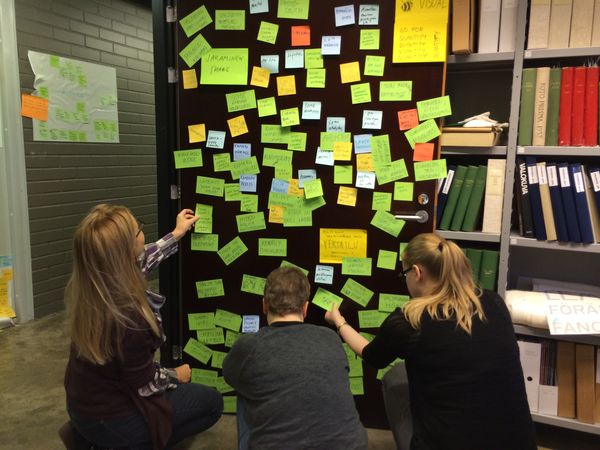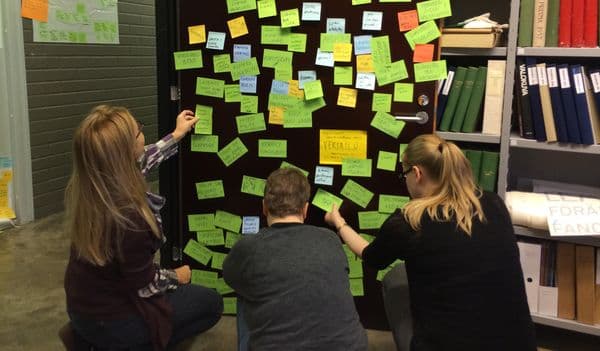 Brainstorming and clustering ideas for the next photography exhibition at The Finnish Museum of Photography. Here we found ideation useful because we were a group of people who had not worked together before.
Brainstorming and clustering ideas for the next photography exhibition at The Finnish Museum of Photography. Here we found ideation useful because we were a group of people who had not worked together before.
"Do we really believe that brainstorming for ideas is necessary?", asked my colleague Mari as we were preparing for a session. "We have many, many examples of how perfectly good services were designed without an explicit session or process to generate ideas."
A friend of mine told me about her cousin and her wife. The cousin had gotten married few months ago and the couple decided to have a very small wedding with only a handful of people present. Few weeks back, the friend of mine met the cousin's wife for the first time. She was a lovely person, and it was great to meet her. But my friend was left slightly empty after the meeting.
Later she realised that the problem was that there had been no big family wedding. "I did not know what her part of the family looks like, how many brothers or sisters she has, what do her parents look like, what do they say in all those embarrassing speeches...". My friend realised that she lacked the subtle and unwritten benefits that a wedding ritual has: a well known process of getting to know the new people in the large group of friends and family.
Often weddings are seen only as old traditions and even symbols of conservatism, and perhaps that is why lot of couples choose to have small weddings or skip the ritual altogether. Another popular line of thought is that "A wedding changes nothing, we have been together for years and have kids. A wedding changes nothing in that".
Holding a brainstorming session for new ideas is like a wedding ceremony. It is a ritual that we are all familiar with and sometimes we get the urge to keep the ideation small and private rather than invite all friends and family to participate.
Just like a wedding, we might feel that a brainstorming session for ideas is unnecessary and artificial. After all, couples get together and live happily ever after even without a wedding. Similarly, ideas are created and turned into successful products without any brainstorming sessions. So, why bother?
Just like there is a point in idea generation sessions, there is a point to a wedding. A wedding is a special event that lets the social circles of the bride and groom (or bride and bride, or groom and groom) to know each other, especially the other half of the couple. A traditional wedding might feel corny with its traditional roles, costumes, phrases, flowers etc. Nevertheless, at the end of the day, the process makes sure that all the relevant people know that this relationship is serious and important. Also, a wedding gives a permission to say positive (and embarrassing) things about the couple, and the wedding becomes a focal point for the families and friends to form new social connections. If there is no wedding, there is a risk of missing some of these important things that make up and shape our relationships to our friends and family.
An organised session for generating new ideas does not guarantee a successful service, but as a ritual, it ensures that some important things are accounted for. In an idea generation session all people involved get an opportunity to contribute, and the session is finally the place and time to focus on solutions (unlike in the beginning where the focus should be on the customers and their problems). The session is also the place and time where it is permitted to be creative and crazy, the session is when we push ourselves outside our conventional thinking. If the session has been a good one, after the session the people involved have a shared understanding, and importantly, after the session people are often more committed to take things forward.
If we decide to skip a brainstorming session in service or product development, it is not the end of the world. Perhaps some more conservative colleagues might get grumpy for not sticking to traditions. However, if we skip a brainstorming session, then we should consider how do we make sure we are not skipping over the benefits of the ritual. Often it is much more convenient to hold a brainstorming session for new ideas and follow the best practices to make sure all things are covered. Otherwise some of our colleagues, clients, partners, and stakeholders might be left with an empty feeling.
At the end of the day, it is the end result that matters both in product design and in relationships. The world is full of examples in which people did not follow rituals and conventions, but nevertheless had good ideas/relationships. All that matters is that we know what we are doing and why – whether it is idea generation or weddings.
Perhaps less sticky notes and more champagne in weddings, though.
- Risto SarvasService Designer, Professor, Company Culture Engineer

